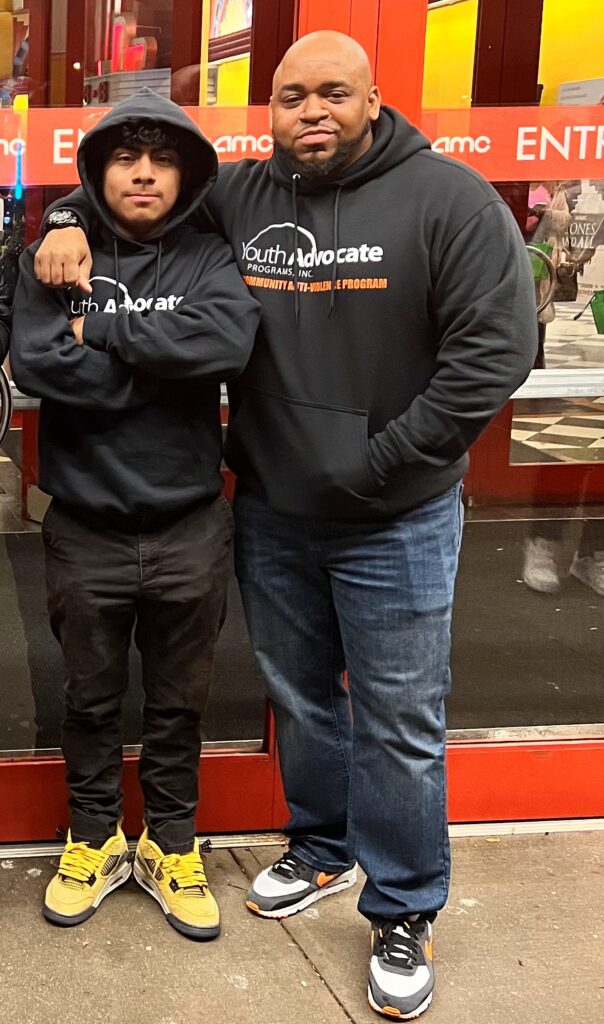New Jersey – Arrested on a gun charge at age 16, Jesse felt hopeless, defeated, and disappointed.
“When I was in that cell, all I could think about was the mistake, letting my parents down, I thought I couldn’t change that; and now I know that I can,” he said.
Jesse is one of nearly 150 young people who have received services from a five-county New Jersey Community-Based Violence Prevention Program launched last summer to reach youths at the highest risk of engagement in violence. A partnership with The New Jersey Department of Community Affairs (DCA) and Youth Advocate Programs (YAP), Inc., the program serves youth ages 12-18 in Atlantic, Camden, Essex, Middlesex, and Ocean counties who have a history of school suspensions, truancies, illegal or violent behavior and/or dealing mental health or substance use issues.
For Jesse, participating in the program came in conjunction with being placed on three years of probation. Now 17, he has stayed out of trouble and is on the honor roll at school. He also holds a part-time job that he secured as part of the program.
“We are glad to see that DCA’s partnership with YAP is paying off,” said Lt. Governor Sheila Y. Oliver, who serves as Commissioner of DCA. “There are so many young men and women, like Jesse, who can benefit from this program. It is important that we continue to invest in our youth and provide them with the support they need to get back on track. The YAP program is doing just that – making lifelong impacts for young people, adults, and their families.”
In its 48th year, YAP is a national nonprofit in 34 states and the District of Columbia that partners with youth justice, child welfare, behavioral health, and public safety systems to provide community-based services as an alternative to youth incarceration, congregate residential placements, and neighborhood violence.
Aligned with its unique evidence-based wraparound services model, YAP hires Credible Messengers with shared experience — some of whom were formerly incarcerated – to provide the New Jersey program participants with ten hours a week of trauma-informed individual and family wraparound support. As part of the program participants can attend weekly group Structured Psychotherapy for Adolescents Responding to Chronic Stress (SPARCS) sessions designed to address violence-related trauma.
“Participants can also take part in YAP Supported Work where community-based employers provide on-the-job training, coaching, and mentoring while the youth receive weekly compensation from YAP,” said Project Director Juan Molina. “Other activities such as peace circles emphasize healing, learning through a collective group process, addressing accountability, repairing harm, and community healing.”
Six months after the program’s launch, 109 young people were receiving services, 29 of whom were attending weekly SPARCS sessions with 21 employed in community Supported Work jobs. Of the participants, 90 percent had no additional contact with the legal system.
Researchers from the Rutgers University Department of Psychology and the Rutgers School of Social Work are working with YAP to evaluate the effectiveness of the multi-site program. Investigators will track program participants’ school attendance and behavior, youth justice system involvement, and other risks associated with violence.
“Jesse received a perfect attendance award for participating in all program activities. His YAP Supported Work employer loves him and has offered to hire him when he completes the program,” said YAP Middlesex County Program Director Emanuel Shumate.
Program referrals come from youth justice, child welfare, behavioral health, and school systems as well as from youths’ friends and family members. Consistent with YAP’s “no reject; no eject” policy, as capacity allows, The New Jersey Community-Based Violence Prevention Program accepts all qualifying referrals in the five-county service areas.
Since becoming a part of YAP, Jesse has recruited friends to enroll. “I realized that the staff who were trying to help me are good people who actually care about people in and outside of the program,” Jesse said. “I was surprised when I learned that YAP Advocates made some of the same kinds of mistakes we had made when they were younger. It taught me that everybody does make mistakes, but you can change from those mistakes.”
Jesse said the program is also making him aware of his strengths and providing opportunities for him to nurture them.
“I learned I have a good heart I care about a lot of people – that I’m smart and a good person,” he said, adding that the services have benefitted his family, too. “They are amazed and proud that I’m back on track.”
YAP will be introducing similar programs to communities nationwide. With input from the New Jersey program participants, the nonprofit has named the program model, YAP Pursuing Excellence™.
YAP’s decades of service include working with many young people whose histories include serious offenses, multiple arrests, and lengthy out-of-home placements. John Jay College of Criminal Justice research found more than 86 percent of YAP’s youth justice participants remain arrest free, and six – 12 months after completing the program, nearly 90 percent of youth served still lived in their communities with less than 5 percent of participants in secure placement.
“Since YAP, I know I can make it out of what I’m in right now and do better and get better and definitely give back,” Jesse said.
Learn more about YAP at www.yapinc.org. Follow the nonprofit on Twitter @YAPInc.

